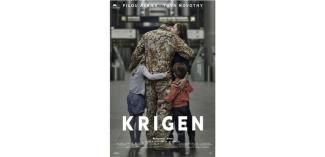Summer Special
Nordic tragedy in Afghanistan

“A war” tells the story of a Danish officer. Its first part is a war movie, and the second part is a court drama. The film does not teach you much about Afghanistan’s problems, but it gives you a good assessment of ethical dilemmas European troops have faced in that far-away country. Some are still deployed there, of course.
The officer commands a rural outpost. His troops regularly patrol the area and sometimes get involved in skirmishes with the Taliban. The morale in the compound declines after one of the soldiers is killed. Some soldiers say they feel like targets. They do not have the impression that they are marking any meaningful difference.
The officer tells them their duty is to protect civilians so they can rebuild their country. To show his solidarity, he decides to lead patrols himself. In the next skirmish, another soldier is severely wounded. A helicopter is needed to save him. To ensure airborne support, the officer tells headquarters that enemies are shelling his troops and a helicopter is needed to bomb the building the attackers are in. The helicopter arrives, destroys the bombed building and rescues the injured soldier.
Soon after, an investigation is started. The reason is that the bomb raid killed civilians, but neither insurgents nor weapons were found in the ruins of the building. The officer is accused of a war crime and sent back to Denmark to be put on trial.
He is happy to be reunited with his family, but he must now worry about a prison sentence that might separate him from wife and children once more. His lawyer tells him he must say that his request for bombing the building was based on reliable information. If he does so, he is likely to be acquitted. Otherwise, he will certainly go to jail. The lawyer admits that he is neither interested in ethics nor the truth; his job is simply to get an acquittal.
In a private conversation, the officer tells his wife that he cannot lie. His wife responds that she and the children need him. Before the court, the officer therefore claims to have had reliable information but that he can not recall the source. His statement does not seem credible. One of the soldiers wore a helmet with a camera during the skirmish, and the footage shows the officer shouting that he wants the helicopter, but does not care who is in the building. In the end, one of the soldiers appears as a witness and claims that he saw gunfire coming from the building during the skirmish. He says he informed the officer. The statement is awkward, to put it mildly, but the officer comes free.
The movie makes it quite clear that the commanding officer faced a dilemma during the skirmish. By ordering the building to be bombed he broke the rules according to which he had to protect civilian people. On the other hand, his duty was to save his soldier’s life, and the attack of the building served that purpose. Had he not given the order, the injured man would have died. In this setting, every option the officer had was bad.
The screenplay makes no judgment. It shows that judge and jury happily accept the dubious witness statement as valid because they do not want to punish the officer. It is made quite obvious that they empathise with him. The implication is impunity after a war crime. The movie shows the officer’s strong feelings of guilt, but does not offer a solution. In the ancient Greek sense, the ethical dilemma is tragic because however the hero acts, he is doomed.
The film shows the great disparity between Denmark and Afghanistan. In Denmark, everything is ordered well. Parents worry about how their children’s emotions develop, and in a medical emergency, they simply rush to the hospital. In Afghanistan, parents worry about their children’s mere survival and cannot protect them from violence. In Denmark, the rule of law is taken seriously, while in Afghanistan various armed groups, including NATO troops, take the law into their own hands. People who live in Denmark cannot understand what is going on in Afghanistan, and even the troops deployed to the country largely remain clueless. They don’t speak the local language, they are homesick, and they do not think their mission is helpful. In the end, the court emphasises with the soldier and takes the rule of law less seriously than Danish norms would normally demand.







